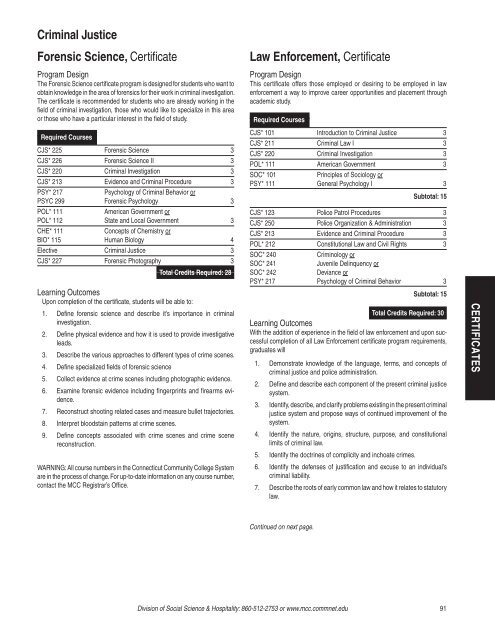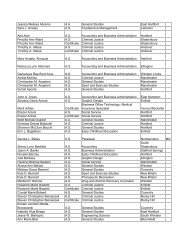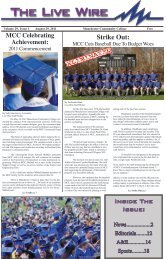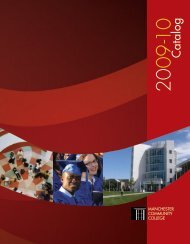Liberal Arts and Science - Manchester Community College ...
Liberal Arts and Science - Manchester Community College ...
Liberal Arts and Science - Manchester Community College ...
You also want an ePaper? Increase the reach of your titles
YUMPU automatically turns print PDFs into web optimized ePapers that Google loves.
Criminal Justice<br />
Forensic <strong>Science</strong>, Certificate<br />
Program Design<br />
The Forensic <strong>Science</strong> certificate program is designed for students who want to<br />
obtain knowledge in the area of forensics for their work in criminal investigation.<br />
The certificate is recommended for students who are already working in the<br />
field of criminal investigation, those who would like to specialize in this area<br />
or those who have a particular interest in the field of study.<br />
Required Courses<br />
CJS* 225 Forensic <strong>Science</strong> 3<br />
CJS* 226 Forensic <strong>Science</strong> II 3<br />
CJS* 220 Criminal Investigation 3<br />
CJS* 213 Evidence <strong>and</strong> Criminal Procedure 3<br />
PSY* 217 Psychology of Criminal Behavior or<br />
PSYC 299 Forensic Psychology 3<br />
POL* 111 American Government or<br />
POL* 112 State <strong>and</strong> Local Government 3<br />
CHE* 111 Concepts of Chemistry or<br />
BIO* 115 Human Biology 4<br />
Elective Criminal Justice 3<br />
CJS* 227 Forensic Photography 3<br />
Learning Outcomes<br />
Upon completion of the certificate, students will be able to:<br />
Total Credits Required: 28<br />
1. Define forensic science <strong>and</strong> describe it’s importance in criminal<br />
investigation.<br />
2. Define physical evidence <strong>and</strong> how it is used to provide investigative<br />
leads.<br />
3. Describe the various approaches to different types of crime scenes.<br />
4. Define specialized fields of forensic science<br />
5. Collect evidence at crime scenes including photographic evidence.<br />
6. Examine forensic evidence including fingerprints <strong>and</strong> firearms evidence.<br />
7. Reconstruct shooting related cases <strong>and</strong> measure bullet trajectories.<br />
8. Interpret bloodstain patterns at crime scenes.<br />
9. Define concepts associated with crime scenes <strong>and</strong> crime scene<br />
reconstruction.<br />
WARNING: All course numbers in the Connecticut <strong>Community</strong> <strong>College</strong> System<br />
are in the process of change. For up-to-date information on any course number,<br />
contact the MCC Registrar’s Office.<br />
Law Enforcement, Certificate<br />
Program Design<br />
This certificate offers those employed or desiring to be employed in law<br />
enforcement a way to improve career opportunities <strong>and</strong> placement through<br />
academic study.<br />
Required Courses<br />
CJS* 101 Introduction to Criminal Justice 3<br />
CJS* 211 Criminal Law I 3<br />
CJS* 220 Criminal Investigation 3<br />
POL* 111 American Government 3<br />
SOC* 101 Principles of Sociology or<br />
PSY* 111 General Psychology I 3<br />
Subtotal: 15<br />
CJS* 123 Police Patrol Procedures 3<br />
CJS* 250 Police Organization & Administration 3<br />
CJS* 213 Evidence <strong>and</strong> Criminal Procedure 3<br />
POL* 212 Constitutional Law <strong>and</strong> Civil Rights 3<br />
SOC* 240 Criminology or<br />
SOC* 241 Juvenile Delinquency or<br />
SOC* 242 Deviance or<br />
PSY* 217 Psychology of Criminal Behavior 3<br />
Subtotal: 15<br />
Total Credits Required: 30<br />
Learning Outcomes<br />
With the addition of experience in the field of law enforcement <strong>and</strong> upon successful<br />
completion of all Law Enforcement certificate program requirements,<br />
graduates will<br />
1. Demonstrate knowledge of the language, terms, <strong>and</strong> concepts of<br />
criminal justice <strong>and</strong> police administration.<br />
2. Define <strong>and</strong> describe each component of the present criminal justice<br />
system.<br />
3. Identify, describe, <strong>and</strong> clarify problems existing in the present criminal<br />
justice system <strong>and</strong> propose ways of continued improvement of the<br />
system.<br />
4. Identify the nature, origins, structure, purpose, <strong>and</strong> constitutional<br />
limits of criminal law.<br />
5. Identify the doctrines of complicity <strong>and</strong> inchoate crimes.<br />
Division of Social <strong>Science</strong> & Hospitality: 860-512-2753 or www.mcc.commnet.edu<br />
6. Identify the defenses of justification <strong>and</strong> excuse to an individual’s<br />
criminal liability.<br />
7. Describe the roots of early common law <strong>and</strong> how it relates to statutory<br />
law.<br />
Continued on next page.<br />
91<br />
CERTIFICATES










